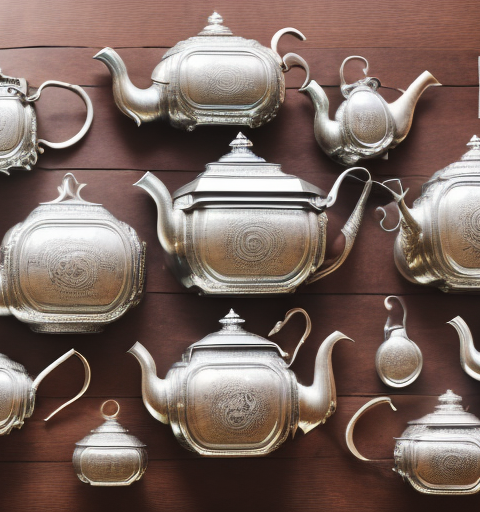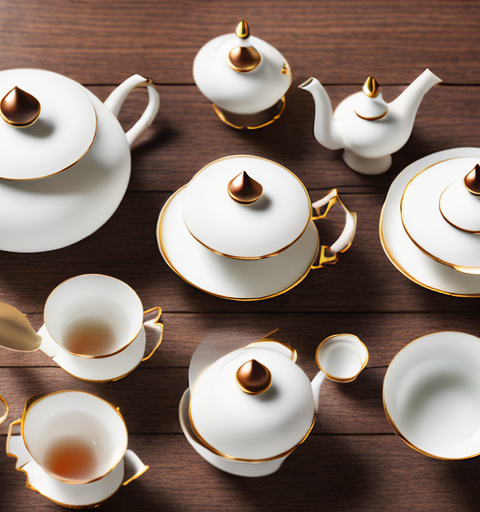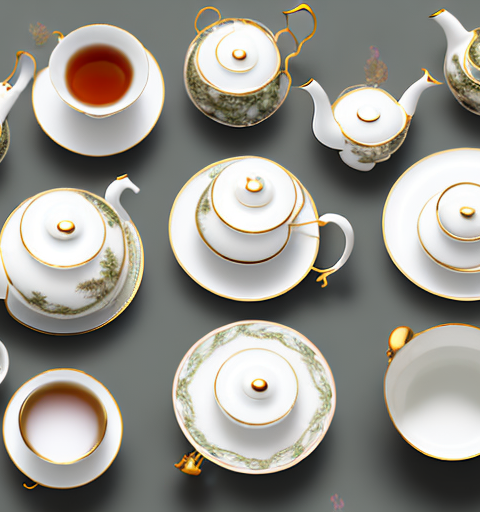Ceramic teapots have been a staple in tea lovers’ kitchens for centuries. Their unique properties make them a popular choice among tea enthusiasts, offering a range of advantages that enhance the tea brewing experience. In this article, we will delve into the many advantages of using a ceramic teapot, exploring their history, types, heat retention capabilities, flavor-enhancing properties, health benefits, eco-friendly features, size and shape considerations, maintenance and care tips, comparisons with other materials, artistry and beauty, modern designs and innovations, ritual and tradition, as well as step-by-step brewing instructions. By the end of this comprehensive guide, you’ll have a deep understanding of why a ceramic teapot is an essential tool for any tea lover’s collection.
Understanding the History of Ceramic Teapots
The rich history of ceramic teapots dates back to ancient times, originating in China during the Song Dynasty. These early teapots were crafted by skilled artisans and were primarily made from clay. As tea drinking spread across different civilizations, ceramic teapots became increasingly popular due to their durability, heat retention, and ability to enhance the flavor of the brewed tea. Today, ceramic teapots continue to honor this long-standing tradition and are cherished for their beauty, functionality, and connection to tea culture.
Throughout history, ceramic teapots have evolved in design and style. In different regions, unique techniques and decorative elements were incorporated into the production of teapots. For example, in Japan, the art of creating teapots reached new heights during the Edo period, with the emergence of intricate hand-painted designs and the use of vibrant glazes. In Europe, during the 18th and 19th centuries, porcelain teapots became highly sought after, with renowned manufacturers such as Wedgwood and Meissen producing exquisite pieces for the aristocracy.
Exploring the Different Types of Ceramic Teapots
Ceramic teapots come in a variety of types, each with its own unique characteristics and aesthetic appeal. Traditional Chinese teapots, such as Yixing teapots, are renowned for their unglazed, porous clay construction, which absorbs the flavors of the tea over time, enriching subsequent brews. Porcelain teapots, on the other hand, offer a more delicate and refined aesthetic, ideal for showcasing the vibrant colors of blooming teas. Stoneware teapots provide excellent heat retention and durability, making them perfect for daily use. Exploring the different types will help you find the perfect ceramic teapot that suits your personal preferences and brewing style.
Another type of ceramic teapot is the earthenware teapot. Earthenware teapots are made from clay that is fired at a lower temperature, resulting in a more rustic and earthy appearance. These teapots are often hand-painted with intricate designs, adding a touch of artistry to your tea brewing experience. While earthenware teapots may not have the same heat retention as stoneware or the flavor-enhancing properties of Yixing teapots, they are still a popular choice for those who appreciate their unique charm.
In addition to the different types of ceramic teapots, there are also various shapes and sizes to consider. Some teapots have a classic round shape, while others may be more elongated or have a whimsical design. The size of the teapot can also vary, ranging from small individual teapots to larger ones that can serve multiple cups. Choosing the right shape and size can enhance your tea brewing experience, as it can affect the steeping process and the overall presentation of the tea.
The Superior Heat Retention of Ceramic Teapots
One of the main advantages of using a ceramic teapot is its superior heat retention properties. Ceramic material has excellent insulation capabilities, allowing your tea to stay hot for longer periods while retaining its optimal brewing temperature. This unique feature ensures that each cup of tea you pour from the teapot is just as warm and flavorful as the first, providing a consistent and enjoyable drinking experience.
In addition to its superior heat retention properties, ceramic teapots also offer other benefits. One such benefit is their ability to distribute heat evenly throughout the teapot, ensuring that every part of the tea is heated uniformly. This helps to extract the full flavor and aroma of the tea leaves, resulting in a more satisfying and enjoyable tea-drinking experience.
Furthermore, ceramic teapots are known for their durability and longevity. The ceramic material is resistant to cracks, chips, and stains, making it a reliable choice for tea enthusiasts. With proper care, a ceramic teapot can last for many years, providing countless cups of delicious tea.
How Ceramic Teapots Enhance the Flavor and Aroma of Tea
Ceramic teapots have the remarkable ability to enhance the flavor and aroma of the tea they brew. The porous nature of the clay or ceramic material allows for a gentle exchange of flavors between the teapot and the tea leaves. Over time, the teapot develops a patina, which adds depth and complexity to the brew. As you use your ceramic teapot regularly, it becomes a cherished vessel that imparts its unique character to your tea, making every sip a truly delightful experience.
One of the reasons why ceramic teapots are so effective at enhancing the flavor and aroma of tea is their ability to retain heat. The thick walls of a ceramic teapot help to keep the tea hot for longer periods of time, allowing the flavors to fully develop. This is especially beneficial for teas that require a longer steeping time, such as black or oolong teas.
In addition to heat retention, ceramic teapots also provide excellent insulation. This means that the temperature of the tea remains consistent throughout the brewing process, ensuring that the flavors are extracted evenly. The result is a well-balanced cup of tea with a harmonious blend of flavors and aromas.
The Health Benefits of Brewing Tea in a Ceramic Teapot
Aside from their aesthetic and functional attributes, ceramic teapots also offer various health benefits. Ceramic is a non-toxic material, free from harmful chemicals that could leach into your tea. Additionally, the even heat distribution of ceramic teapots allows for a gentle and controlled brewing process, ensuring that the tea’s beneficial compounds, such as antioxidants, are preserved. With a ceramic teapot, you can enjoy not only the taste of your favorite tea but also reap its many health benefits.
Furthermore, ceramic teapots have the ability to retain heat for longer periods of time compared to other materials. This means that your tea will stay hot for a longer duration, allowing you to savor each cup without the need for constant reheating. The prolonged heat retention also helps to extract more flavor and aroma from the tea leaves, resulting in a richer and more satisfying tea-drinking experience.
In addition to their heat retention properties, ceramic teapots are also known for their durability. Unlike glass or porcelain teapots, ceramic teapots are less prone to breakage and can withstand high temperatures without cracking. This makes them a reliable and long-lasting choice for tea enthusiasts who want a teapot that can withstand regular use and occasional mishaps.
Eco-Friendly Features: Why Choose a Ceramic Teapot
Choosing a ceramic teapot also aligns with eco-friendly practices. Ceramic is a natural and sustainable material, which reduces your carbon footprint compared to teapots made from synthetic or disposable materials. Additionally, ceramic teapots are highly durable and can last for years with proper care, minimizing the need for frequent replacements. By investing in a ceramic teapot, you contribute to a more sustainable future while enjoying the pleasures of tea.
Furthermore, ceramic teapots are non-toxic and do not leach harmful chemicals into your tea. Unlike some plastic or metal teapots, ceramic does not react with hot water or alter the taste of your tea. This ensures that you can enjoy a pure and authentic tea-drinking experience, free from any potential health risks.
Tips for Choosing the Right Size and Shape of Ceramic Teapot
When selecting a ceramic teapot, it’s essential to consider your brewing needs and personal preferences. The size of the teapot should align with your typical brewing quantity, ensuring that each cup is as fresh and flavorful as possible. The shape of the teapot also plays a role in the brewing process, with wider, flatter teapots promoting better heat distribution and more consistent flavor extraction. By choosing the right size and shape, you can optimize your ceramic teapot for the best possible tea brewing experience.
Additionally, it’s important to consider the material of the ceramic teapot. Different types of ceramic, such as porcelain or stoneware, can affect the taste and temperature retention of the brewed tea. Porcelain teapots are known for their ability to retain heat well, while stoneware teapots are often favored for their durability and rustic charm. Take into account your personal preferences and the type of tea you typically brew when selecting the material of your ceramic teapot.
Maintenance and Care: Keeping Your Ceramic Teapot in Pristine Condition
Maintaining the pristine condition of your ceramic teapot is crucial for its longevity and continued performance. After each use, it’s essential to rinse the teapot thoroughly with warm water, removing any residual tea leaves and preventing flavors from mixing. Avoid using abrasive cleaning materials that could scratch the teapot’s surface, and instead opt for gentle cleaning techniques. Additionally, proper storage in a cool, dry place will help prevent damage and preserve the teapot’s aesthetic appeal.
Furthermore, it is important to handle your ceramic teapot with care to avoid any accidental drops or impacts that could lead to cracks or breakage. When pouring hot water into the teapot, do so slowly and steadily to prevent sudden temperature changes that could cause thermal shock. It is also recommended to avoid placing your teapot directly on a stove or open flame, as this can cause damage to the ceramic material.
Comparing Ceramic Teapots to Other Materials: Which is Best?
While ceramic teapots offer many advantages, it’s essential to consider how they compare to teapots made from other materials. Materials such as glass, cast iron, and stainless steel all have their unique characteristics and benefits. Glass teapots allow for a visual appreciation of the tea’s color and clarity, while cast iron teapots offer exceptional heat retention. Stainless steel teapots are known for their durability and ease of maintenance. Understanding the differences between these materials can help you decide which teapot best suits your brewing style and preferences.
Another material commonly used for teapots is porcelain. Porcelain teapots are known for their delicate and elegant appearance. They often feature intricate designs and patterns, making them a popular choice for tea enthusiasts who value aesthetics. Porcelain teapots also have excellent heat retention properties, similar to cast iron teapots. However, they are more fragile and require careful handling to prevent breakage. Consider the balance between aesthetics and durability when deciding between a ceramic or porcelain teapot.
The Artistry and Beauty of Handcrafted Ceramic Teapots
The craftsmanship involved in creating handcrafted ceramic teapots is truly a work of art. Skilled artisans meticulously shape the clay, creating stunning designs and intricate patterns. Each handmade ceramic teapot is a unique piece, showcasing the creativity and talent of the potter. By owning a handcrafted ceramic teapot, you not only enjoy the benefits of its functionality but also possess a piece of art that adds beauty and elegance to your tea-drinking ritual.
One of the remarkable aspects of handcrafted ceramic teapots is the attention to detail that goes into their creation. Artisans spend hours perfecting the shape and form of each teapot, ensuring that it not only functions well but also pleases the eye. From the graceful curves of the handle to the delicate spout, every element is carefully considered to create a harmonious and visually appealing design.
Furthermore, the glazing and firing process adds another layer of artistry to handcrafted ceramic teapots. Artisans skillfully apply glazes in a variety of colors, creating stunning effects that enhance the beauty of the teapot. The firing process, which involves subjecting the teapot to high temperatures, transforms the clay and glazes into a durable and lustrous finish. The result is a teapot that not only serves its purpose but also becomes a captivating centerpiece in any tea setting.
Exploring Modern Designs and Innovations in Ceramic Teapots
While traditional designs hold a special place in tea culture, modern ceramic teapots have also made their mark by integrating innovative features and artistic interpretations. Contemporary teapots often incorporate ergonomic handles for comfortable pouring, built-in infusers for easy steeping, and striking color combinations. These modern designs offer a harmonious blend of functionality and aesthetics, catering to various tastes and preferences among tea enthusiasts today.
The Ritual and Tradition of Serving Tea in a Ceramic Teapot
The act of brewing and serving tea in a ceramic teapot encompasses a rich ritual and a deep-rooted tradition. The process of carefully measuring tea leaves, heating water to the ideal temperature, and pouring the aromatic brew into cups is a calming and meditative experience. Ceramic teapots, with their heritage and symbolic significance, elevate this ritual, allowing tea lovers to connect with the centuries-old traditions of tea culture and appreciate the mindful moments that tea brings.
Step-by-Step Guide: How to Brew the Perfect Cup of Tea with a Ceramic Teapot
Brewing tea with a ceramic teapot requires a thoughtful approach to ensure the best results. First, preheat the teapot by rinsing it with warm water. Measure the appropriate amount of tea leaves and place them in the teapot’s infuser or directly into the pot. Heat water to the recommended temperature for your tea type and pour it over the leaves. Allow the tea to steep for the specified duration, then pour it into cups, enjoying the beautiful color and aroma. With this step-by-step guide, you’ll soon be able to brew the perfect cup of tea that showcases the full potential of your ceramic teapot.
Understanding the Economic Advantages of Using a Ceramic Teapot
In addition to its many functional and aesthetic benefits, using a ceramic teapot also offers economic advantages. Ceramic teapots, though often considered an investment, can last for years with proper care, eliminating the need for regular repurchases. By brewing your own tea at home using a ceramic teapot, you also reduce the expense of purchasing tea from cafes and teahouses. Over time, the cost savings can be significant, making a ceramic teapot a sensible choice for tea enthusiasts who value both quality and value.
Enhancing Your Tea Time Experience with a Decorative Ceramic Teapot
Lastly, a decorative ceramic teapot can transform your tea time into a visually delightful experience. Whether adorned with intricate patterns or boasting a vibrant color palette, a decorative teapot adds a touch of elegance and charm to your tea table. With its graceful form and eye-catching design, a decorative ceramic teapot becomes a centerpiece during social gatherings, evoking conversation and appreciation for both its artistic value and the tea it holds.
In conclusion, the advantages of using a ceramic teapot are manifold, making it an indispensable tool for tea lovers. From its deep-rooted historical connections to its ability to enhance the flavor and aroma of tea, a ceramic teapot offers a wealth of benefits. Its superior heat retention, health advantages, eco-friendly features, and meticulous craftsmanship all contribute to a unique and fulfilling tea experience. By choosing a ceramic teapot, you not only elevate your tea brewing rituals but also become part of a rich tradition that honors the art and culture of tea.






